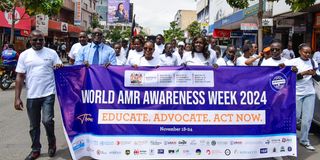Doctors sound warning on antibiotics resistance in patients

Nakuru celebrates World Antimicrobial Resistance Week with a walk along Kenyatta Avenue, on November 20, 2024.
Many of us have experienced the frustration of taking medicine after developing different symptoms, but it backfires and does not work as expected.
Mtaa Wangu met a patient, Reese*, who says she has been suffering from recurring bouts of pneumonia, and despite completing her prescribed medication, she hasn’t seen any improvement since last year.
Her frustration is an example of how treatment failure can leave patients feeling hopeless, especially when the medication doesn’t seem to work as it should.
Hence, the issue of antimicrobial resistance (AMR).
AMR happens when antimicrobial drugs (antibiotics) no longer work on bacteria, viruses, fungi, or parasites.
Due to drug resistance, infections become difficult or impossible to treat, and antibiotics and other antimicrobial medications lose their effectiveness, raising the risk of disease transmission, serious sickness, disability, and death.
Nakuru joined the rest of the world yesterday in commemorating the antimicrobial resistance awareness week, in a bid to sensitize the public about the dangers of AMR and the role each person has to play in promoting the rational use of antimicrobial agents.
Dr. Lydia Momanyi, a clinical pharmacist at Nakuru Referral and Teaching Hospital and the county antimicrobial stewardship focal person, says that as professionals, they have noticed certain patterns.
“We are seeing a rise in the prevalence of AMR, particularly in inpatients where we have noticed growing organisms that are quite resistant to the commonly used antibiotics,” says the medic.
She adds that they are, however, sensitizing communities to promote certain interventions, amongst them completing antibiotic doses, following prescriptions accordingly, and avoiding self-medication.
Additionally, she advises visiting a healthcare facility to get a proper diagnosis and tests conducted to confirm infection before antimicrobial agents and the culprit of all is stopping or avoiding sharing antibiotics.
Themed ‘Educate, Advocate, and Act Now’, the day is meant to create awareness of the misuse and overuse of antimicrobials in humans, animals, and plants, which are the main drivers in the development of drug-resistant viruses and bacteria.
“We are also using one health approach, which means we are coming together as the departments of agriculture, health, and environment because we realize antimicrobial agents are being used across the board.”
“We are encouraging farmers to have prudent use of antimicrobial agents (AMA) to avoid spreading these resistant pathogens in livestock or plants, which eventually end up in our bodies. We also encourage proper disposal of antibiotics to avoid AMA leaking into the water systems and eventually getting into our bodies through drinking water,” says Dr. Lydia.
The same goes for healthcare professionals who are encouraged to conduct and ensure proper diagnoses and, most importantly, promote Infection Prevention Control (IPC) measures.
"We need to boost our IPC practices at the hospital and home because an infection prevented means an antibiotic not used, and that means resistance will be avoided, thus preventing the overuse and misuse of antibiotics,” says Dr. Lydia.
